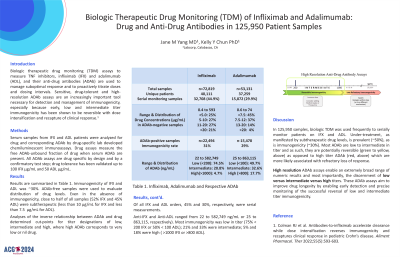Monday Poster Session
Category: IBD
P2660 - Biologic Therapeutic Drug Monitoring (TDM) of Infliximab and Adalimumab: Serial Monitoring and Distribution of Drug and Anti-Drug Antibodies in 125,950 Patient Samples
Monday, October 28, 2024
10:30 AM - 4:00 PM ET
Location: Exhibit Hall E

Has Audio

Kelly Chun, PhD
Labcorp
Calabasas, CA
Presenting Author(s)
Jane Yang, MD, Kelly Chun, PhD
Labcorp, Calabasas, CA
Introduction: Biologic therapeutic drug monitoring (TDM) assays to measure TNF inhibitors, infliximab (IFX) and adalimumab (ADL) and their anti-drug antibodies (ADAb), are utilized to manage suboptimal response and to proactively titrate doses and dosing intervals. Sensitive, drug-tolerant and high-resolution ADAb assays are an increasingly important tool necessary for detection and management of immunogenicity, especially because early, low and intermediate titer immunogenicity has been shown to be reversible with dose intensification and recapture of clinical response.1
Methods: Sera from IFX and ADL patients were analyzed for drug and corresponding ADAb by drug-specific lab developed chemiluminescent immunoassays. Drug assays measure the free ADAb-unbound fraction of drug when serum ADAb are present. All ADAb assays are drug specific by design and by a confirmatory test step; drug tolerance has been validated up to 100 IFX μg/mL and 50 ADL μg/mL.
Results: Results are summarized in Table 1. Immunogenicity was ~30%. ADAb-free samples were used to evaluate drug levels. Even in the absence of immunogenicity, many, 25% IFX (< 5 μg/mL) and 45% ADL (< 7.5), were subtherapeutic. Analyses of the inverse relationship between ADAb and drug determined cut-points for titer designations of low, intermediate and high, where high ADAb corresponds to very low/nil drug. 45% and 30% of all IFX and ADL orders were serial measurements. Anti-IFX and Anti-ADL ranged from 22 to 582,749 ng/mL or 25 to 863,115. Most immunogenicity was low in titer, 75% < 200 IFX or 50% < 100 ADL; 21% and 33% were intermediate; 5% and 18% were high at >1000 IFX or >800 ADL.
Discussion: In 125,950 samples, biologic TDM was used frequently to serially monitor patients on IFX and ADL. Under-treatment, as manifested by subtherapeutic drug levels, is prevalent, as is immunogenicity. Most ADAb are low to intermediate in titer and as such, they are potentially reversible as opposed to high titer ADAb which are more likely associated with refractory loss of response. High resolution ADAb assays enable the discernment of low versus intermediate versus high titers. These ADAb assays have helped improve drug longevity with early detection and precise monitoring of the successful reversal of low and intermediate titer immunogenicity.1
1. Colman RJ et al. Antibodies-to-infliximab accelerate clearance while dose intensification reverses immunogenicity and recaptures clinical response in pediatric Crohn's disease. Aliment Pharmacol Ther 2022;55(5):593-603.
Note: The table for this abstract can be viewed in the ePoster Gallery section of the ACG 2024 ePoster Site or in The American Journal of Gastroenterology's abstract supplement issue, both of which will be available starting October 27, 2024.
Disclosures:
Jane Yang, MD, Kelly Chun, PhD. P2660 - Biologic Therapeutic Drug Monitoring (TDM) of Infliximab and Adalimumab: Serial Monitoring and Distribution of Drug and Anti-Drug Antibodies in 125,950 Patient Samples, ACG 2024 Annual Scientific Meeting Abstracts. Philadelphia, PA: American College of Gastroenterology.
Labcorp, Calabasas, CA
Introduction: Biologic therapeutic drug monitoring (TDM) assays to measure TNF inhibitors, infliximab (IFX) and adalimumab (ADL) and their anti-drug antibodies (ADAb), are utilized to manage suboptimal response and to proactively titrate doses and dosing intervals. Sensitive, drug-tolerant and high-resolution ADAb assays are an increasingly important tool necessary for detection and management of immunogenicity, especially because early, low and intermediate titer immunogenicity has been shown to be reversible with dose intensification and recapture of clinical response.1
Methods: Sera from IFX and ADL patients were analyzed for drug and corresponding ADAb by drug-specific lab developed chemiluminescent immunoassays. Drug assays measure the free ADAb-unbound fraction of drug when serum ADAb are present. All ADAb assays are drug specific by design and by a confirmatory test step; drug tolerance has been validated up to 100 IFX μg/mL and 50 ADL μg/mL.
Results: Results are summarized in Table 1. Immunogenicity was ~30%. ADAb-free samples were used to evaluate drug levels. Even in the absence of immunogenicity, many, 25% IFX (< 5 μg/mL) and 45% ADL (< 7.5), were subtherapeutic. Analyses of the inverse relationship between ADAb and drug determined cut-points for titer designations of low, intermediate and high, where high ADAb corresponds to very low/nil drug. 45% and 30% of all IFX and ADL orders were serial measurements. Anti-IFX and Anti-ADL ranged from 22 to 582,749 ng/mL or 25 to 863,115. Most immunogenicity was low in titer, 75% < 200 IFX or 50% < 100 ADL; 21% and 33% were intermediate; 5% and 18% were high at >1000 IFX or >800 ADL.
Discussion: In 125,950 samples, biologic TDM was used frequently to serially monitor patients on IFX and ADL. Under-treatment, as manifested by subtherapeutic drug levels, is prevalent, as is immunogenicity. Most ADAb are low to intermediate in titer and as such, they are potentially reversible as opposed to high titer ADAb which are more likely associated with refractory loss of response. High resolution ADAb assays enable the discernment of low versus intermediate versus high titers. These ADAb assays have helped improve drug longevity with early detection and precise monitoring of the successful reversal of low and intermediate titer immunogenicity.1
1. Colman RJ et al. Antibodies-to-infliximab accelerate clearance while dose intensification reverses immunogenicity and recaptures clinical response in pediatric Crohn's disease. Aliment Pharmacol Ther 2022;55(5):593-603.
Note: The table for this abstract can be viewed in the ePoster Gallery section of the ACG 2024 ePoster Site or in The American Journal of Gastroenterology's abstract supplement issue, both of which will be available starting October 27, 2024.
Disclosures:
Jane Yang indicated no relevant financial relationships.
Kelly Chun indicated no relevant financial relationships.
Jane Yang, MD, Kelly Chun, PhD. P2660 - Biologic Therapeutic Drug Monitoring (TDM) of Infliximab and Adalimumab: Serial Monitoring and Distribution of Drug and Anti-Drug Antibodies in 125,950 Patient Samples, ACG 2024 Annual Scientific Meeting Abstracts. Philadelphia, PA: American College of Gastroenterology.
